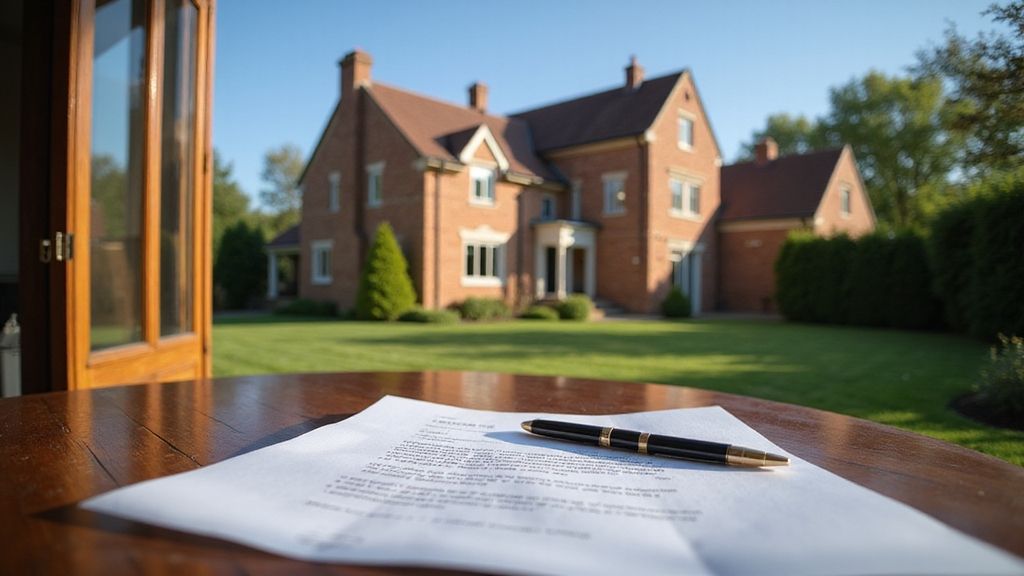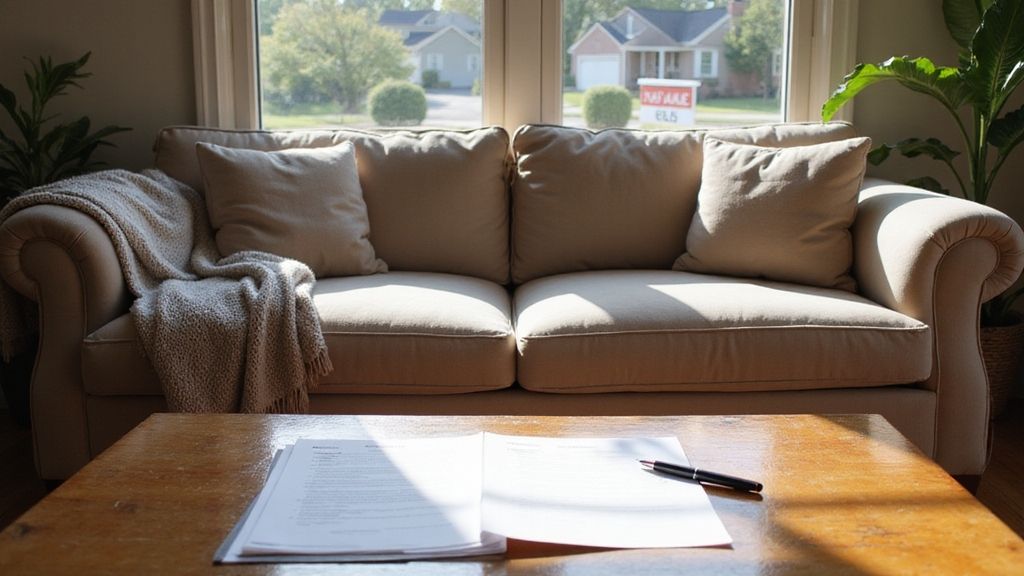Can Property Be Transferred Without Probate?

Navigating the estate labyrinth without court intervention seems almost impossible for grieving families. The probate process drags on for months, consuming up to 7% of estate values while heirs wait helplessly. Financial institutions freeze accounts, properties sit vacant, and bills pile up during this frustrating period. Fortunately, Pennsylvania offers several legal pathways to bypass these probate headaches entirely.
Property can absolutely be transferred without probate in Pennsylvania through several effective methods. These include joint ownership with survivorship rights, revocable living trusts, beneficiary designations, and small estate affidavits for estates under $50,000.
In this blog I will explore everything related to transferring property without probate in Pennsylvania.
Key Takeaways
- Joint ownership with right of survivorship automatically transfers property to surviving owners, bypassing probate entirely.
- Revocable living trusts allow property to transfer directly to beneficiaries without court supervision or probate delays.
- Beneficiary designations on retirement accounts, life insurance, and payable-on-death bank accounts enable immediate asset transfers.
- Small estates under $50,000 can use simplified affidavits to transfer property without full probate proceedings.
- Avoiding probate doesn’t eliminate Pennsylvania inheritance taxes, which still apply based on relationship to the deceased.
What Is Probate and Why Might You Avoid It?

Probate is Pennsylvania’s court-supervised process where the Register of Wills authenticates your will, pays your debts, and distributes your assets—a procedure that typically takes 9–24 months and costs 4–7% of your estate’s value.
You’ll want to avoid it because it drains both money and time from your loved ones while adding emotional stress during an already difficult period.
Understanding probate’s mechanics helps you choose smarter property transfer strategies that keep your assets out of court and in your family’s hands faster.
Definition of Probate Process
Probate is the legal process that validates a will and authorizes asset distribution after someone dies. Pennsylvania’s Register of Wills oversees this procedure, which includes will verification, debt payment, and asset distribution.
The process typically takes nine to twenty-four months and costs four to seven percent of the estate’s value.
Families often face emotional challenges during these proceedings. Fortunately, several alternatives exist. Trusts, beneficiary designations, and joint ownership arrangements help transfer property without probate delays.
As a result, these strategies protect your loved ones from unnecessary expenses and complications.
Time and Cost Implications
Probate in Pennsylvania costs between 4-7% of your estate’s total value. A $500,000 estate faces $20,000 to $35,000 in expenses. Your beneficiaries receive nothing until this process completes.
The process typically takes nine to twenty-four months, delaying support to loved ones. These delays can create hardship for family members needing immediate financial assistance.
Additionally, the court fees, legal expenses, and executor compensation quickly add up.
Non-probate transfers through trusts and beneficiary designations help avoid these costs. Your family won’t face these expenses or waiting periods.
In essence, strategic estate planning protects more assets for your beneficiaries.
Emotional Burden on Families
Probate creates significant emotional stress for grieving families. They must handle court appearances, legal deadlines, and complex paperwork while mourning. This combination often feels overwhelming during an already difficult time.
Non-probate tools can protect your family from these burdens. Beneficiary designations and revocable trusts bypass court proceedings entirely.
Small estate affidavits simplify the process for estates valued under $50,000. Your advance planning transforms their experience dramatically. Instead of months in court, they’ll experience straightforward asset transfers.
Most importantly, this thoughtful preparation allows them to focus on healing rather than wrestling with legal complications.
What Property Can Transfer Without Probate?
Property that transfers without probate includes assets with designated beneficiaries or special ownership structures. These arrangements help your family avoid court proceedings after your death.
Joint real estate with right of survivorship titles automatically passes to surviving owners. Retirement accounts and life insurance policies transfer directly to named beneficiaries.
Bank accounts can be registered as payable-on-death to specific individuals.
Securities can use transfer-on-death registration in most states. Pennsylvania allows beneficiary designations for financial accounts and securities.
However, Pennsylvania doesn’t recognize transfer-on-death deeds for real estate. As an alternative, consider establishing revocable trusts or joint ownership arrangements for your property.
How Do Joint Ownership Arrangements Work?

When you own property jointly with another person, the type of ownership determines whether your share passes automatically at death or enters probate.
Pennsylvania recognizes two main forms that avoid probate: joint tenancy with right of survivorship and tenancy by the entirety for married couples.
You won’t find community property with right of survivorship here, as Pennsylvania doesn’t recognize that ownership structure.
Joint Tenancy with Right of Survivorship
Joint tenancy with right of survivorship transfers property directly to surviving co-owners when you die. This arrangement bypasses probate in Pennsylvania. Your deed must clearly establish this ownership structure.
This arrangement offers several advantages. Your family avoids lengthy probate proceedings during their grieving process. Surviving owners gain immediate access to the property without court involvement.
Pennsylvania law still requires payment of inheritance tax despite probate avoidance.
Furthermore, joint tenancy protects co-owners from complex legal procedures. Proper documentation prevents potential disputes among family members. This ownership method provides peace of mind for all parties involved.
Tenancy by the Entirety
Tenancy by the entirety is a property ownership method for married couples in Pennsylvania. It combines joint tenancy benefits with extra protections.
When one spouse dies, property transfers automatically to the surviving spouse without probate. This saves time and court costs during difficult periods.
Only joint creditors can make claims against entireties property. Individual creditors can’t touch these assets. This protection creates a financial shield for married couples.
Additionally, neither spouse can sever this arrangement independently.
For married couples seeking probate avoidance and asset protection, this ownership form offers significant advantages. In essence, it provides peace of mind through dual benefits.
Community Property with Right of Survivorship
Pennsylvania doesn’t recognize community property with right of survivorship. Instead, married couples in Pennsylvania use tenancy by the entirety for automatic property transfer after death.
Pennsylvania follows different property ownership laws than community property states. Families relocating from states like California or Arizona should update their property titles.
Tenancy by the entirety offers similar benefits, including probate avoidance and creditor protection. Furthermore, property deeds from community property states may need reformation to comply with local laws.
Proper title preparation prevents delays when a spouse dies. This protection matters most during times of grief.
Professional guidance ensures Pennsylvania families maintain appropriate ownership forms for their circumstances.
What Are Living Trusts and How Do They Help?
A revocable living trust lets you transfer property ownership to a trust entity you control, allowing your assets to bypass probate entirely when you pass away.
You’ll need to actively fund the trust by retitling your real estate, bank accounts, and investments in the trust’s name during your lifetime.
Your designated trustee then steps in after your death to distribute assets according to your instructions without court involvement.
Revocable Living Trusts Explained
A revocable living trust is a legal arrangement that holds your assets during life and distributes them after death without court involvement. You control the trust as trustee while alive and name a successor for after your passing.
Your family benefits in several ways. They avoid the 9-24 month probate delay that typically holds up asset distribution. The trust keeps financial matters private with no public court records.
Furthermore, your loved ones gain immediate access to necessary assets during a difficult time.
The trust reduces costs compared to the 4-7% fees associated with probate. It also provides continuity of care if you become incapacitated. As a result, your family experiences less stress during challenging periods.
You maintain full control throughout your lifetime. The trust can be modified anytime according to your changing needs or wishes.
Process of Funding Your Trust
Transfer ownership of your assets into your trust’s name after creating the document.
Record new deeds for real property to change the title.
Update ownership documentation for bank accounts.
Retitle investment accounts, vehicles, and business interests under the trust’s name.
Your trust only works when properly funded.
Unfunded trusts can’t distribute assets outside of probate court. As a result, your family might face unnecessary delays and expenses.
Work with your attorney to ensure correct transfers of all assets. Document each transfer carefully.
Review your trust periodically to include new property.
This regular maintenance protects your estate plan and your loved ones’ future interests.
Trustee Responsibilities
A trustee manages trust assets and follows your instructions for distribution. This person takes on important duties in revocable living trusts. Your trustee ensures smooth inheritance transfers for your beneficiaries.
Key trustee responsibilities include protecting your family’s assets and paying outstanding debts and taxes. They also distribute inheritance according to your wishes.
Additionally, trustees maintain detailed financial records. During times of grief, they act with integrity on your family’s behalf.
Choose someone organized and trustworthy. Most importantly, select a person willing to serve your family when they need help most. This final decision safeguards your legacy.
How to Use Beneficiary Designations Effectively?
You can transfer many assets directly to your heirs by naming beneficiaries on retirement accounts, life insurance policies, and bank accounts—completely bypassing probate.
Pennsylvania law allows transfer-on-death (TOD) designations for securities and payable-on-death (POD) designations for bank accounts, making these simple tools for estate planning.
Properly completed beneficiary forms ensure your assets move immediately to your chosen recipients without court involvement or delay.
Retirement Accounts and Life Insurance
Retirement accounts and life insurance bypass probate court. Your beneficiaries receive funds within weeks instead of months. They avoid unnecessary legal fees and emotional stress during their time of grief.
Outdated beneficiary designations may accidentally disinherit loved ones you intended to support. This common oversight happens when life changes occur. Regular updates to your beneficiary forms ensure your money goes where you want it.
The funds can help your family pay immediate expenses. Funeral costs, mortgage payments, and daily needs don’t stop when someone passes away.
Your thoughtful planning provides financial stability during a difficult transition period.
Transfer on Death Deeds
Pennsylvania doesn’t recognize transfer-on-death deeds for real estate. You must use alternative methods to transfer property outside probate in this state.
Pennsylvania law requires using trusts or joint ownership for real estate transfers after death.
Other assets like securities, bank accounts, and retirement funds can still have beneficiary designations. These designations allow assets to transfer directly without court involvement.
Review your accounts yearly to ensure beneficiaries match your current wishes.
Furthermore, coordinate with financial institutions to establish proper TOD registrations for eligible assets. Always update these designations after marriages, divorces, or births.
This planning helps your loved ones avoid probate delays and unnecessary expenses.
Payable on Death Accounts
Beneficiary designations let your assets transfer directly to named individuals without probate.
These designations override your will instructions, making accuracy crucial.
A payable on death account allows transfers without court involvement. This approach saves your family from delays and expenses.
Review your beneficiaries often to maintain current wishes.
Update your beneficiaries after major life events like marriages or births.
Name backup recipients in case your primary choices die before you.
Coordinate these designations with your overall estate plan. Furthermore, keep all documents where loved ones can find them quickly.
Verify all spellings and identifying information to avoid claim problems later.
What Legal Tools Allow Property Transfers Without Probate?
You have several legal tools at your disposal to transfer property without going through probate in Pennsylvania.
While Lady Bird deeds and life estates aren’t commonly used or recognized in PA for probate avoidance, you can rely on small estate affidavits when the estate’s value is $50,000 or less.
Understanding which tools are available—and which aren’t—in Pennsylvania will help you choose the most effective strategy for your situation.
Lady Bird Deeds
Pennsylvania doesn’t recognize Lady Bird deeds for property transfers. These deeds work in Florida, Michigan, and Texas but aren’t valid legal tools in Pennsylvania.
Families often face unexpected delays when relying on this approach. Many receive incorrect advice from out-of-state sources during already difficult times.
Pennsylvania law requires different methods for transferring property without probate. Failed attempts with invalid documents only create more expenses and emotional strain.
Instead, consider Pennsylvania-approved options like transfer-on-death deeds or revocable living trusts. These alternatives provide similar benefits while complying with state requirements.
Furthermore, proper estate planning with local expertise prevents painful surprises for your loved ones.
Life Estates
A life estate deed transfers property to your beneficiaries while you retain living rights until death. You keep control during your lifetime and ensure automatic property transfer after you pass away. The arrangement helps your heirs avoid probate court proceedings.
Pennsylvania residents rarely use life estates for probate avoidance compared to other states. This option comes with restrictions. You can’t sell or mortgage the property without permission from remaindermen.
Additionally, gift tax consequences may arise when you create a life estate.
Furthermore, a life estate doesn’t eliminate Pennsylvania inheritance tax obligations. Before choosing this method for your family situation, seek legal advice. An attorney can evaluate whether this approach meets your specific estate planning needs.
Small Estate Affidavits
Pennsylvania’s small estate affidavit helps families avoid formal probate for smaller estates. This legal tool applies to estates valued at $50,000 or less, excluding real property. Families can access bank accounts, wages, and insurance quickly without court proceedings.
This process delivers several important benefits for grieving families. They receive faster financial relief, often within weeks instead of months. The costs remain minimal compared to thousands in typical probate expenses.
Paperwork requirements stay simple, reducing stress during difficult times. Bills get paid promptly without court delays. Additionally, families maintain privacy throughout the process.
The legal basis comes from Pennsylvania Code 20 Pa.C.S. § 3101, which created this streamlined alternative.
What Are the Tax Implications of Avoiding Probate?
Avoiding probate doesn’t eliminate tax obligations in Pennsylvania. Inheritance tax applies to all property transfers regardless of how assets change hands. Joint ownership, beneficiary designations, and revocable trusts still trigger inheritance tax requirements.
Pennsylvania inheritance tax rates vary by relationship: spouses (0%), children (4.5%), siblings (12%), and others (15%).
Estate tax planning requires separate strategies from probate avoidance. As a result, your beneficiaries need proper guidance.
Tax returns must be filed within nine months after death to avoid penalties. Good planning helps reduce these costs while still bypassing probate’s complications.
Conclusion
Transferring property without probate in Pennsylvania offers significant benefits for homeowners and their families. When properly structured, these transfers can save thousands in court costs and prevent lengthy delays. We at Pezon Properties regularly help clients navigate these options to protect their legacy. Our team understands the emotional and financial impact of probate proceedings.
If you’re concerned about your estate plan, several effective strategies exist to bypass the probate process entirely. Joint ownership, beneficiary designations, and living trusts can immediately transfer assets upon death. We buy houses in Pennsylvania and assist homeowners in implementing these protective measures. Pezon Properties serves communities throughout Pennsylvania State with personalized guidance.
The consequences of inadequate estate planning can be severe for your loved ones. Without proper arrangements, even modest estates may face months in court and diminished value. We believe everyone deserves a clear path for their assets after death. Contact Pezon Properties today to explore your options for probate-free property transfers in Pennsylvania.
Give us a call anytime at 484-484-0971 or fill out this quick form to get started today!
Get A Fair Cash Offer On Your House

About the author
Mathew Pezon
Mathew Pezon is the founder and CEO of Pezon Properties, a cash home buying company located in Lehigh Valley, Pennsylvania. With several years of experience in the real estate industry, Mathew has become a specialist in helping homeowners sell their properties quickly and efficiently. He takes pride in providing a hassle-free, transparent, and fair home buying experience to his clients. Mathew is also an active member of his local community and is passionate about giving back. Through his company, he has contributed to various charities and causes.















